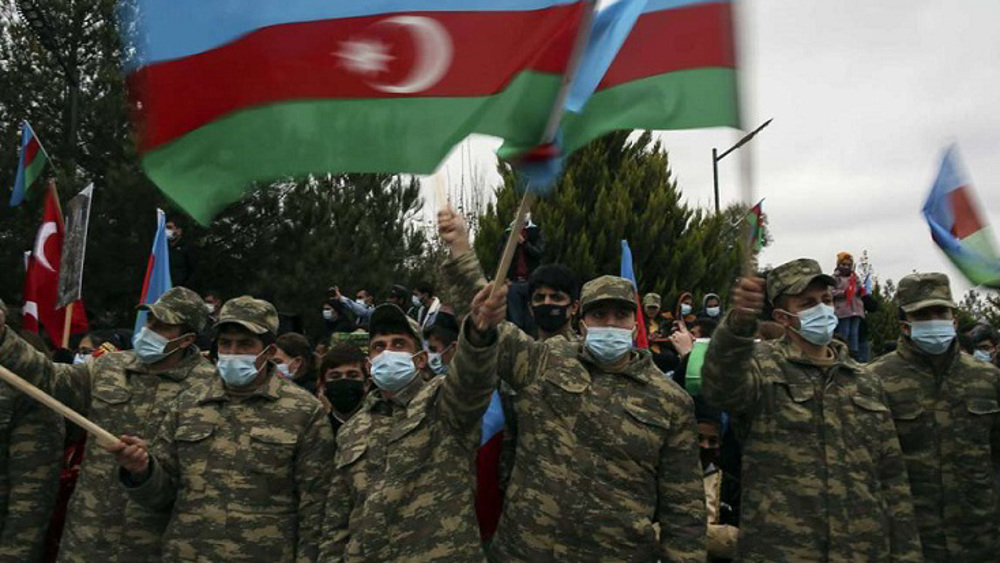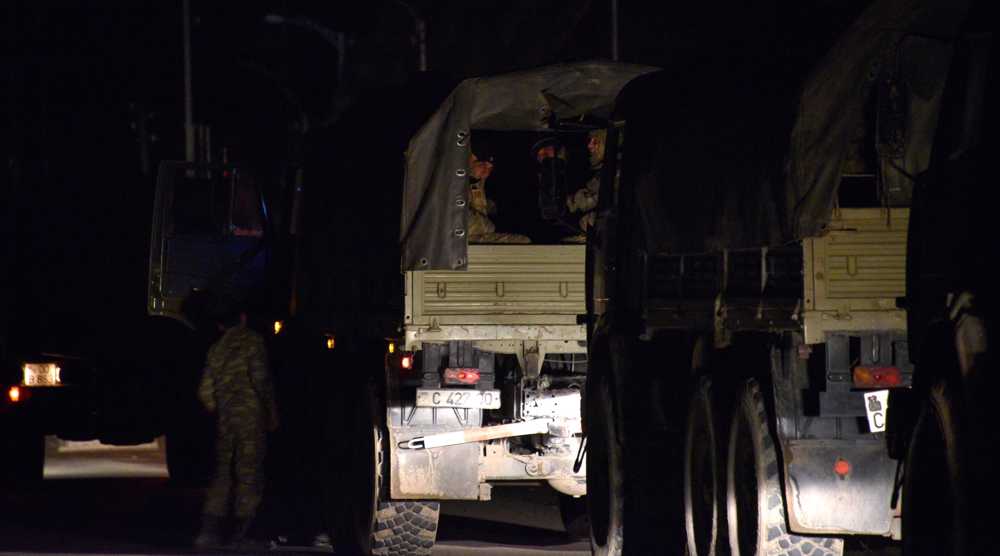Rouhani voices Iran’s readiness to help consolidate Karabakh truce as Tehran stresses permanent solution to dispute
Iranian President Hassan Rouhani has welcomed the establishment of a ceasefire between Armenia and Azerbaijan over the disputed Narabakh region, announcing Tehran’s readiness to help strengthen the truce and establish security in the region.
During a meeting with Azeri Foreign Minister Jeyhun Bayramov in Tehran on Wednesday, Rouhani expressed satisfaction with the end of the war between the two ex-Soviet republics, the liberation of the occupied territories of Azerbaijan and the establishment of a ceasefire there.
He reaffirmed the clear position of the Islamic Republic of Iran regarding the Nagorno-Karabakh conflict and his country’s support for the territorial integrity of the Republic of Azerbaijan.
Elaborating on Iran’s efforts to end the military clashes there, Rouhani said that Iran sent a special envoy to Russia, Azerbaijan and Armenia as part of a plan to help halt the conflict in the Nagorno-Karabakh region, and stressed that the Islamic Republic was ready to play a constructive role in strengthening the ceasefire between the two countries.
On bilateral relations, he described ties with the neighborly country of Azerbaijan as good and fraternal and said, "The will of the Islamic Republic of Iran is to promote relations with the Republic of Azerbaijan, and we hope that the ties between the two countries will be further developed through taking an opportunity to create new international conditions.”
Rouhani also voiced Iran’s readiness to participate in reconstruction of the liberated areas of Azerbaijan following the recent war in the Karabakh region.
For his part, the Azeri foreign minister praised Iran’s support for the territorial integrity of his country and said, "We consider Iran our good friend and neighbor, and the will of the president and officials of Azerbaijan is to develop all-out relations with Iran."
He also expressed optimism that the two countries can implement joint cooperation projects after the removal of the existing obstacles caused by the US sanctions against Iran.
He also condemned the recent assassination of senior Iranian nuclear scientist Mohsen Fakhrizadeh as unjustifiable.
“The assassination of a scientist is not acceptable at all and we strongly condemn this act,” he said.
Iran stresses permanent solution to Karabakh dispute
Separately on Wednesday, the Azeri foreign minister met and held talks with his Iranian counterpart, Mohammad Javad Zarif.

In the meeting, Zarif explained the principled policies of the Islamic Republic of Iran towards the Caucasus region based on good neighborliness, and stressed the need for a permanent solution to the crisis through dialogue and diplomacy.
He also welcomed the progress made towards the ceasefire and a peace agreement over Karabakh, as well as the liberation of the territories of the Republic of Azerbaijan.
Pleased to host Azerbaijan's FM @bayramov_jeyhun. Welcomed end of hostilities and restoration of Azeri territorial integrity.
— Javad Zarif (@JZarif) December 9, 2020
Fruitful talks on furthering comprehensive bilateral cooperation—incl reconstruction of war-torn areas, North/South Corridor, Caspian energy & much more. pic.twitter.com/ZEhnqqpaRZ
Bayramov, for his part, lauded the positions of the Islamic Republic of Iran during the conflict and its support for the end of the occupation, and described Iran's policy towards the Nagorno-Karabakh crisis as balanced.
The two sides also discussed bilateral ties as well as regional developments.
Iran’s security chief warns of malicious bids by US, Israel, Daesh in region
The Azeri top diplomat also sat down with Iran’s secretary of Supreme National Security Council to discuss regional developments, bilateral ties and the recent military confrontation in Karabakh.

During the meeting, Ali Shamkhani pointed to malicious measures by the warmongering and terrorist triangle of the US, the Zionist regime and Daesh, and said their presence in any part of the world, especially in the West Asian region, is harmful and creates crises while their departure from the region would lead to stability and peace.
“Countries in the region must work together to prevent the creation of new centers of insecurity and troubles,” Shamkhani said.
Last month, Armenia and Azerbaijan signed a ceasefire agreement to end the war in Nagorno-Karabakh after weeks of conflict that re-erupted in late September, becoming the worst fighting in the region in decades.
Under the agreement, Yerevan and Baku agreed on November 9 to end hostilities under a Moscow-brokered deal that secured territorial advances for Azerbaijan in Karabakh and seven surrounding districts.
Nagorno-Karabakh is internationally recognized as part of Azerbaijan but has been populated by ethnic Armenians.

In his meeting with the visiting Azeri official, Iranian Parliament Speaker Mohammad Baqer Qalibaf welcomed the truce in Karabakh and said the liberation of the occupied territories in Nagorno-Karabakh is an important step towards achieving lasting peace and security.
He also warned about the presence of terrorist forces on the territory of Azerbaijan, and said the continued presence of terrorists and certain moves by the Zionist regime of Israel in this country pose a threat to peace and security in the region.
Noting that there is a deep cultural and religious bond between the two nations of Iran and the Republic of Azerbaijan, Qalibaf added that the two countries should tap into their capabilities and potential to elevate cooperation in different sectors, including the economy.
President Yoon Suk Yeol to be removed from office
At least 19 Gazans killed by Israeli airstrikes since dawn: Medics
Leader: Iran neither has nor needs proxy forces
US fighter aircraft shot down ‘in friendly fire’ amid aggression on Yemen
Yemeni FM: Israel’s sponsors accountable for ongoing aggression on Sana’a
Eight Palestinians killed as Israel attacks Gaza school, hospitals
VIDEO | Rome, Milan host new protests in solidarity with Palestinians
Dec. 21: ‘Axis of Resistance’ operations against Israeli occupation












 This makes it easy to access the Press TV website
This makes it easy to access the Press TV website